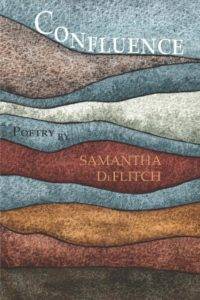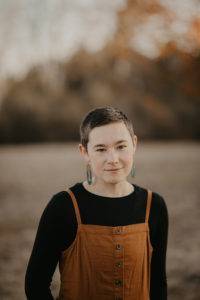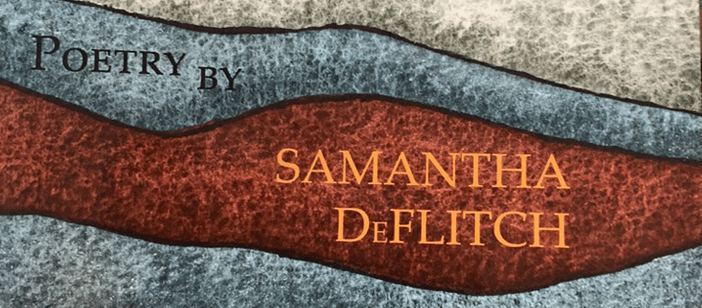From the Publisher: The confluence in the title of this debut collection from Samantha DeFlitch describes the meeting of three rivers, the Monongahela and Allegheny which come together at Pittsburgh to form the Ohio. The three sections of her book are named for these rivers, and there are many poems of place here, the author’s home turf, its backroads and bridges, state lines, amusement parks, a town called Zelienople, even Pittsburgh itself, depicted most provocatively as a city of “accidental lesbians.”
But as a gas station attendant says when she answers where she is from, Nobody lives in Pittsburgh, an observation that shifts the register from the physical to the psyche, and to a different sort of confluence, the way in which we are all products of every- thing that has come before and come together to form our lives. DeFlitch depicts this in the construction of her poems. There are many recurring images and motifs, of oranges and blackbirds, dogs, pierogis, gas stations, concern over the aging of parents, of aging herself, of a “boy named John” who “put a bullet in his head” because he didn’t want to grow old – and of folding chairs that turn up everywhere, such a brilliantly efficient exemplar of the temporary. She repeats words, lines, even nearly entire poems, and in this manner her poems resemble merging waters, full of ripples, eddies, swirls, back currents of detritus, endlessly forming and reforming over time and space.
The book opens with a striking and disturbing dreamlike scene of peeling an orange to find within it an endless succession of rotten oranges, a surreal suggestion of a world composed of decay, giving way to a swirl of blackbirds over a horizon, a lake over- flowing a dam, a chaos of interwoven imagery. That unsettled and unsettling vision informs this entire collection, a confluence of currents which DeFlitch must navigate in her life journey from “today-woman to someday-woman.” “Tell me,” she asks at one point, “am I holy / or just alone?” The answer, of course, for her and for us all, is both.
But the final poem begins with the equally arresting fact that a pig cannot raise its head to see the sky unassisted, which prompts DeFlitch to conclude
Earthbound is probably
better. We all start
getting ideas when we
look up, and the pigs,
they always seemed so
pleased where they were,
rooting in soft earth.
No need to look up for God
when the holy was there,
beneath their trotters….What begins in chaos ends in hope: we have, and we are, all that we need. “I have what it takes to be average,” she declares. Perhaps; but not where her poetry is concerned – in that, she is exceptional.
Praise for Samantha DeFlitch & Confluence:
“In these poems, you’ll find grace and gritty miracles in the unlikeliest of places: laundromats, gas stations, pig pens, the streets of Pittsburgh. The electricity of deep feeling and hard-won honesty hums through the entire book, sometimes in fireworks, sometimes in the faint charge of faraway lightning. Each poem shines on its own. And there are plenty of very different subjects. It’s not like the book is about one thing. It’s about earth and heaven and everything in between. And yet at the same time, the book feels so whole, the poems, very quietly, speaking to each other, giving sparks and stars to each other. The way the poems pay attention to their neighbors, so to speak, is what fills the book with such painful grace, miracles that are gritty and raw. It is perfect in what seems to be so effortless, the beautiful voice, the way Samantha sees and then says the world. I will be reading and rereading this book for the rest of my life. Buy this book for the people you love. Maybe also for the people you don’t love. It will give them hope.”—Mekeel McBride, author of Dog Star Delicatessen
“These are poems of visiting the outskirts—the edges of rooms, deserts, amusement parks and cities. They’re about never fitting in and never knowing how to be in the moment, the reverberations of grief refusing to let us settle down. So what a surprise then, that Confluence also offers much in the way of consolation. Turns out that along the peripheries is still plenty of wonder: oranges inside of oranges and transportive passage, if you find the right bridge. Never belonging to one place means the possibility of arriving elsewhere, perhaps in time to decode the wild scrawls left in the dirt under an ocotillo tree or the rune-writing of hair and white sheets wrapping a sleeping woman. More than anything else is the promise here: we can be hurt, deeply injured, “split boned,” even, and still, miraculously, also be fine.”—Shelley Girdner, author You Were That White Bird
“Pittsburgh is where the metaphysical East Coast really starts to end and where the Midwest begins to start, America’s true subconscious. In Samantha DeFlitch’s terrific debut Pittsburgh is a liminal ghost world made a place of transformation and possibility by way of exile and loneliness. Only Pittsburgh can be more than Pittsburgh, as Jack Gilbert taught us. DeFlitch has taken the lesson to heart. Only the 10,000 varieties of homelessness will allow the magic to enter your life—she knows this. That’s the trade-off. The results are soulful and quickening.”—David Rivard, author of Standoff
About the author: Samantha DeFlitch earned her MFA from the University of New Hampshire. Her work has appeared in The Missouri Review, Appalachian Review, Hobart, On the Seawall, and Rust + Moth, among others. She was a finalist in the 2020 Tupelo Press Four Quartets: Poetry in the Pandemic Open Call, and her manuscript was deemed a Manuscript of Extraordinary Merit in the 2019 Tupelo Press Open Reading Period. She is the 2018 recipient of the Dick Shea Memorial Award for Poetry. Confluence is her debut collection of poetry.
Samantha has taught poetry and composition courses at Great Bay Community College and at the University of New Hampshire. Her teaching was recognized with the UNH 2018 Summer Teaching Assistant Fellowship, which supported her research on the representation of the Pittsburgh dialect in poetry. She currently serves as the Associate Director of the Connors Writing Center at UNH.
Originally from a small town outside of Pittsburgh, Samantha currently lives in Portsmouth, New Hampshire. She is working on her second book with the help of her corgi dog, Moose.
Samantha’s work can be found at samanthadeflitch.com.
About the artist: Connie DeFlitch hails from Western Pennsylvania, where she raised her children to love the outdoors and hiking. Most summers found them making the trek to the White Mountains for their family vacation. When her husband retired in the spring of 2019, they decided to make the jump and landed in Jackson, New Hampshire.
A self-taught artist, Connie enjoys painting in both traditional and whimsical form, utilizing bright colors and granulating textures in her artistry. Her process incorporates her love for the White Mountains – you can often find her on the trails, taking photos that will become the inspiration for her original watercolors.
Connie’s art is quirky and delightful, snapshots in time and place, reflecting the simple beauty of the Whites. Today, her art can be found in homes and offices across the country – from New England to California, from Florida to the Pacific Northwest. Her work is on display at Jackson Art Studio and Gallery, and she is the forthcoming featured artist at Tin Mountain Conservation Center. Her work has been displayed at the Gallery at WREN, the Met Coffee House & Art Gallery, and TreeCity Arts, among others.
Connie’s work can be found at conniedeflitch.com.
 What comes to mind when you think of Pittsburgh?
What comes to mind when you think of Pittsburgh?
The people and the landscape. I think these are two key thruways in Confluence, and the book is interested in exploring the relationship between these two; how people influence the landscape, but also how landscape creates a people. As the book progresses, people become the physical city and the city becomes incarnate. To me, this feels like opening nesting dolls: a bridge gives way to a grandmother gives way to Irwin gives way to a dog, all living within the container of Pittsburgh.
And of course, I think of “big-hitter” locations like the Strip, Kennywood, the now-gone Civic Arena. But I also think of my intimate Pittsburgh: Route 30, a laundromat in Irwin, a barbershop, a quiet Macy’s parking lot, fish fries. I’m really interested in the tension between an almost myth-like experience of Pittsburgh and the personal experience, and I think that shows up quite a bit.
 Can you talk a bit about how Pittsburgh appears in your poems?
Can you talk a bit about how Pittsburgh appears in your poems?
Pittsburgh is a real liminal space and I love playing with that in Confluence. One of my blurbers notes that these poems are looking for “gritty miracles in the unlikeliest of places.” The poems are constantly searching for wonders, and the book returns an answer: we find them on the Turnpike onramp; in a pothole on Route 30; in a Sheetz parking lot; on the patio at Ianni’s; on the bank of the Monongahela. That is, if we look hard enough.
These poems hold a large space in their hands – pain, loss, hope, dreams – and are stitched together by connection to place. One of my friends notes this deep attachment to place is accompanied by a feeling of fragmentation and estrangement – which makes sense. I wrote this book while living in New Hampshire, feeling very riven from home. There are no pierogi races in New Hampshire, no paczki or fish fries – and at that time, no family. But amid the heavy feelings of loss, there is compassion in these poems, a large love that flows through the entire work. And that love – along with the Turnpike – is the thru-line of the poems.
There are a lot recurring images and motifs in these poems…
Confluence opens with the poem “Downed Birds,” which is a meditative sequence with repeating images of oranges and blackbirds. For me, it an instruction on how to read the book: these poems are not stagnant. Look for them to appear again.
To that end, there’s repetition of oranges, folding chairs, dogs, pierogis, a gunshot, gas stations, old age, and bridges in these poems. Places become people become places, never resting in one location. A light in a window becomes a childhood memory becomes a dog becomes a dog. I push time backward and forward through people and places. The repetition of words, images, lines, and sometimes entire poems is really the experience of living. Things don’t stay where we experienced them; they swirl and ebb and flow through our lives and reappear in surprising places. And even if it looks like the same poem, it isn’t.
Another really interesting repetition is the search for the voices of my parents. I think the straightforward reason for this is that I missed home – my family and Pennsylvania. But I also think the poems are longing to capture the voices of resilience, love, and hope. That longing is the answer to the book’s constant questioning: what is the holy thing, and where will the miracle take place?
What books are on your nightstand?
Cardinal by Tyree Daye, A God in the House: Poets Talk About Faith edited by Ilya Kaminsky and Katherine Towler, Should Our Own Undoing Come Down Upon Us White by Jill Osier, The Lunatic by Charles Simic, Life on Mars by Tracy K. Smith. And my dear friend Rhosalyn William’s book, Girls and Boys in Water. It’s a big nightstand.
For more about Confluence and Samantha DeFlitch, visit samanthadeflitch.com. You can also connect with DeFlitch on Twitter and Instagram.

























